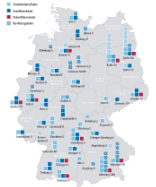|
|
|
|
|
|
|
News & Views item - July 2013 |
![]() Germany Possibly to Broaden its Funding for Research and Higher Education. (July
20,
2013)
Germany Possibly to Broaden its Funding for Research and Higher Education. (July
20,
2013)
Germany's Excellence Initiative was initiated in 2005 with the aim to improve the quality of German universities and research institutions in order to make Germany "a more attractive research location, making it more internationally competitive and focussing attention on the outstanding achievements of Germany universities and the German scientific community". The German Research Foundation (Deutsche Forschungsgemeinschaft, DFG) which provides financial support for research in higher education and public research institutions, but does not run any research establishments itself, was given responsibility for running the initiative together with the German Science Council.
 In its first phase the initiative nominated a select number of institutions in
three categories: Graduate Schools to promote young scientists and researchers;
Clusters of Excellence to promote cutting-edge research; Institutional
Strategies on projects to promote top-level research.
In its first phase the initiative nominated a select number of institutions in
three categories: Graduate Schools to promote young scientists and researchers;
Clusters of Excellence to promote cutting-edge research; Institutional
Strategies on projects to promote top-level research.
38 projects at 22 universities were selected for funding on 13 October 2006: 18 Graduate Schools, 17 Clusters of Excellence and three Institutional Strategies. They were funded up to November 2011 with a total of €873 million.
The outcome of the second round of applications was announced in June last year. There were a total of 146 proposals which included resubmissions from the 38 successful applicants from round one. 46 of the proposals were successful of which 33 were continuing from round one, leaving 12 new.
In November 2012 Australia's Group of Eight (Go8) released a Go8 "Bachgtounder-24a"
The German Excellence Initiative update![]() which includes the map (p.6) supplied by DFG.
which includes the map (p.6) supplied by DFG.
Overall the "Backgrounder" sees the Excellence Initiative as a success: "The competition promoted internal communication in all universities and led to positive outcomes including the development of a greater appreciation of the complex environment within which universities are operating and research takes place", and sums up the challenges facing the Initiative as it enters this second round:
Germany’s science and innovation system has been permanently changed and influenced by the decisions of the Excellence Initiative and by the pact for research and innovation on the funding of non-university research. Robust and sustainable strategies are now necessary to maintain and further develop the innovation system strengths that the Excellence Initiative has created.
The success of the initiative has led to a renewed discussion about how universities in Germany with their renewed focus on excellence can compete against outstanding institutions abroad in funding competitions; and on how they can play an enhanced role in Germany becoming a preferred location for science and innovation. Universities are also exploring new forms of cooperation with non-university organisations and the business sector. Besides the need to overcome legal hurdles which can inhibit this cooperation, universities also need to protect the profile which they developed through the Excellence Initiative and, while focussing on the priority areas identified by the public and policy makers, continue to maintain broader capabilities.
Now it's eight months since the Go8 released its "Backgrounder" and Science's Gretchen Vogel writes in the journal's current issue: "Germany's recent push to boost a handful of its universities to the world's top ranks got a yellow light this week. A prominent advisory council recommended taking a break from the national competition to find, and fund, Germany's top schools. Funding should focus on strengthening a broad base of research—and teaching—at the country's universities, according to a 15 July report from the German Council of Science and Humanities (Wissenschaftsrat)." And in her opinion: "Change is coming because the budget-boosting agreements end between 2015 and 2019, and national elections in September will decide who gets to set the policies that will take their place... [and this] week's report from the Wissenschaftsrat... proposes two new funding mechanisms to support top research at a broad spectrum of schools [our emphasis]: establishing Merian professorships, named for 17th century naturalist and illustrator Maria Sibylla Merian, which would provide €1 million per year to each of 250 leading academics; and setting up roughly 40 Liebig Centers (named for chemist Justus von Liebig), to boost key research areas. The competition for top schools could be revisited in 10 to 15 years, the report says."
It remains to be seen if the German research establishment will take up the recommendation of the Wissenschaftsrat in a manner where they play the individual/research group per se rather than the institution.